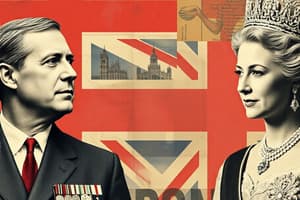Podcast
Questions and Answers
What type of government allows component states to retain their individual identities?
What type of government allows component states to retain their individual identities?
- Unitary government
- Monarchy government
- Federal government (correct)
- Flexible government
Which form of government is headed by a monarch exercising absolute power?
Which form of government is headed by a monarch exercising absolute power?
- Flexible government
- Federal government
- Unitary government
- Monarchy government (correct)
What is a common characteristic of monarchy governments?
What is a common characteristic of monarchy governments?
- Elected monarchs
- Decentralized power
- Limited power
- Hereditary rulership (correct)
Which government type does not allow for an even development according to the text?
Which government type does not allow for an even development according to the text?
What is a significant demerit of confederal governments according to the text?
What is a significant demerit of confederal governments according to the text?
Which type of constitution is characterized by a centralized government with power held at the national level?
Which type of constitution is characterized by a centralized government with power held at the national level?
What is a defining feature of a flexible constitution?
What is a defining feature of a flexible constitution?
In a federal constitution, where does the power lie predominantly?
In a federal constitution, where does the power lie predominantly?
Which type of government system is characterized by a hereditary head of state, often with limited powers?
Which type of government system is characterized by a hereditary head of state, often with limited powers?
Do military systems of government typically enjoy widespread legitimacy?
Do military systems of government typically enjoy widespread legitimacy?
What term describes the process through which the military seizes control of a government?
What term describes the process through which the military seizes control of a government?
What is the primary advantage of a monarchy as a system of government according to the text?
What is the primary advantage of a monarchy as a system of government according to the text?
Which of the following is NOT listed as a demerit of monarchy in the text?
Which of the following is NOT listed as a demerit of monarchy in the text?
In a constitutional monarchy, what is the role of the monarch according to the text?
In a constitutional monarchy, what is the role of the monarch according to the text?
Which of the following statements best describes an absolute monarchy according to the text?
Which of the following statements best describes an absolute monarchy according to the text?
Which of the following is a fundamental difference between an absolute monarchy and a constitutional monarchy?
Which of the following is a fundamental difference between an absolute monarchy and a constitutional monarchy?
Based on the information provided in the text, which of the following statements is true?
Based on the information provided in the text, which of the following statements is true?
Flashcards are hidden until you start studying
Study Notes
Monarchy
- The monarch serves as a symbol of national loyalty and protects/preserves the culture and traditions of the people.
- The monarch's decisions are taken without unnecessary delay, promoting political stability.
- Obedience to the monarch is seen as obedience to God.
Demerits of Monarchy
- Leadership qualities are based on hereditary rights, which may lead to an absence of good governance.
- The practice of monarchy is undemocratic since ascension to the throne is based on hereditary rather than elections.
- It may not function well in a country with many ethnic groups.
- It is prone to the emergence of a dictatorial and oppressive ruler/monarch.
Types of Monarchy
- Absolute Monarchy: The monarch has unlimited powers, ruling by divine right, e.g., King Khaled of Saudi Arabia.
- Constitutional Monarchy: The monarch has limited powers, derived from the constitution, and is a ceremonial head of state, e.g., the King/Queen of the UK.
Merits of Confederational Government
- Enables component states to retain their individual identities.
- Makes it possible for a political union to be formed among people of different cultural backgrounds.
- Brings weak component states together to form a strong country.
- Reduces the fear of domination among the component states.
Demerits of Confederational Government
- Encourages secession.
- Has a weak central government.
- Citizens pay allegiance to their own state governments rather than the central government.
- Does not encourage political unity among the confederating states.
- Does not allow for even development.
Constitutionalism
- A constitution is an established body of laws, principles, rules, conventions, and regulations that govern a country.
- Sources of a constitution include Acts of Parliament and Constitutional Conferences.
- The scope of a constitution includes the principles, rules, and regulations governing the country.
- Features of a constitution include its rigidity and supremacy.
- Functions of a constitution include limiting power, protecting individual rights, and promoting the rule of law.
Studying That Suits You
Use AI to generate personalized quizzes and flashcards to suit your learning preferences.




